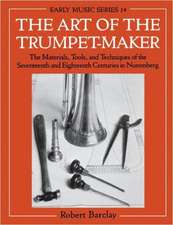Hearts of Pine: Songs in the Lives of Three Korean Survivors of the Japanese Comfort Women
Autor Joshua D. Pilzeren Limba Engleză Paperback – 22 mar 2012
| Toate formatele și edițiile | Preț | Express |
|---|---|---|
| Paperback (1) | 264.46 lei 31-37 zile | |
| Oxford University Press – 22 mar 2012 | 264.46 lei 31-37 zile | |
| Hardback (1) | 684.06 lei 31-37 zile | |
| Oxford University Press – 22 mar 2012 | 684.06 lei 31-37 zile |
Preț: 264.46 lei
Nou
Puncte Express: 397
Preț estimativ în valută:
50.62€ • 55.00$ • 42.55£
50.62€ • 55.00$ • 42.55£
Carte tipărită la comandă
Livrare economică 10-16 aprilie
Preluare comenzi: 021 569.72.76
Specificații
ISBN-13: 9780199759576
ISBN-10: 019975957X
Pagini: 216
Ilustrații: 20 black and white photographs
Dimensiuni: 231 x 152 x 15 mm
Greutate: 0.3 kg
Ediția:New.
Editura: Oxford University Press
Colecția OUP USA
Locul publicării:New York, United States
ISBN-10: 019975957X
Pagini: 216
Ilustrații: 20 black and white photographs
Dimensiuni: 231 x 152 x 15 mm
Greutate: 0.3 kg
Ediția:New.
Editura: Oxford University Press
Colecția OUP USA
Locul publicării:New York, United States
Recenzii
Hearts of Pine is a highly interpretive account. It is, at all times, personal, with Pilzer moving amoungst the three women, going with them on trips or to the weekly demonstration outside the Japanese Embassy in Seoul, talking, drinking and sharing songs. ... Pilzer's text jolts us into not just memorializing, but into recognizing that real women were involved.
Notă biografică
Joshua D. Pilzer grew up in Virginia and Nashville, Tennessee playing folk music and punk rock. He discovered Korean music in 1993, and soon after began graduate work in ethnomusicology, studying at the University of Hawaii and the University of Chicago, where he completed his PhD in 2006. He has since worked at the University of California, Santa Barbara, Columbia University, and the University of Toronto, where since 2009 he has been Assistant Professor in the Faculty of Music.











